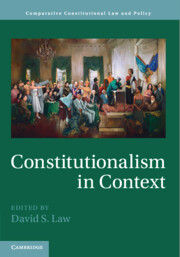Book contents
- Reviews
- Constitutionalism in Context
- Comparative Constitutional Law and Policy
- Constitutionalism in Context
- Copyright page
- Dedication
- Contents by Topic
- Contents by Region
- Figures
- Tables
- Contributors
- User’s Guide and Preface
- Abbreviations
- I Introduction to the Field
- II Concepts and Definitions
- III Constitutional Drafting and Revision
- IV Constitutional Adjudication and Interpretation
- 9 Judicial Review of Constitutional Amendments: Taiwan
- 10 Nonjudicial Constitutional Interpretation: The Netherlands
- 11 Transnational Judicial Communication: The European Union
- V Rights
- VI Structure
- VII Challenges to Liberal Democratic Constitutionalism
- Index
- References
11 - Transnational Judicial Communication: The European Union
from IV - Constitutional Adjudication and Interpretation
Published online by Cambridge University Press: 17 February 2022
- Reviews
- Constitutionalism in Context
- Comparative Constitutional Law and Policy
- Constitutionalism in Context
- Copyright page
- Dedication
- Contents by Topic
- Contents by Region
- Figures
- Tables
- Contributors
- User’s Guide and Preface
- Abbreviations
- I Introduction to the Field
- II Concepts and Definitions
- III Constitutional Drafting and Revision
- IV Constitutional Adjudication and Interpretation
- 9 Judicial Review of Constitutional Amendments: Taiwan
- 10 Nonjudicial Constitutional Interpretation: The Netherlands
- 11 Transnational Judicial Communication: The European Union
- V Rights
- VI Structure
- VII Challenges to Liberal Democratic Constitutionalism
- Index
- References
Summary
National judicial systems within the European Union (EU) face pressures toward alignment under the policy agendas for judicial cooperation connected with the Lisbon Treaty and the widespread practice of ‘transnational borrowing’ among courts. Using the CJEU and ECtHR as case studies in the phenomena of judicial culture and transnational judicial communication, this chapter explores how constitutional norms and formal policies interact with contextual influences (including informal judicial interaction and evolving national ideas and practices regarding judging and judicial organisation) to produce increasing legal alignment among the member states. In doing so, the chapter explicitly highlights the need to combine comparative legal analysis with socio-legal research methods in order to understand the evolution of constitutional law.
Keywords
- Type
- Chapter
- Information
- Constitutionalism in Context , pp. 236 - 260Publisher: Cambridge University PressPrint publication year: 2022



